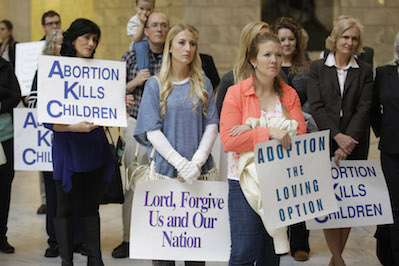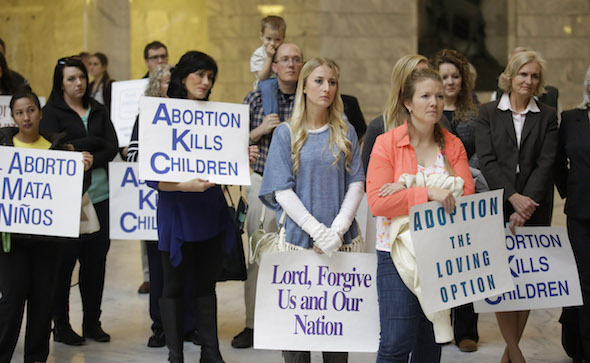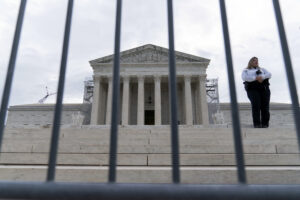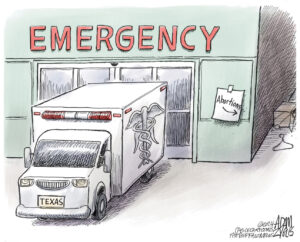Creeping Restrictions on Abortion and Voting Are Going Unchecked
The media are failing to cover the insidious erosion of rights taking place mostly—but not exclusively—in Red states.

An anti-abortion rally at the Utah State Capitol on Nov. 18 in Salt Lake City. (Rick Bowmer / AP)
Although it has gone virtually unnoticed because a declining number of journalists cover state government, big Republican gains in statehouses last year have resulted in a political revolution that has inflicted great damage on voting rights and access to abortion.
Millions of people will be affected by these changes in the law. One set subjects a woman’s body to the whims of the state. The other deprives people—generally the poor and the old—of their right to vote.
Taken together, they amount to a public policy revolution that began with Republican gains in state legislatures in 2010. Those gains were no accident. They occurred in districts drawn—or gerrymandered—by Republicans to assure victory in legislative and congressional elections. While the development has been noted in some media, it hasn’t generated the sensational coverage that even a minor national political event, such as a presidential candidate’s staff shake-up, gets on television, print or social media.
According to the Pew Research Center, the number of reporters covering state government across the nation declined by 35 percent between 2003 and 2014—a loss of 164 jobs. Television and radio attention is all but nonexistent, reflecting the bosses’ diminished interest in state coverage, once a prestigious journalistic mainstay. Not that an abundance of reporters would necessarily result in limits on anti-abortion laws. Texas has several tough restrictions on abortion but, according to Pew, has more full-time reporters covering the Capitol than does any other state. But elsewhere, the number has dropped. Experienced reporters are quitting or being laid off and not replaced, or college students, interns and part-timers end up filling the slots, Pew reports.
Not having to face a horde of nosy and experienced reporters, it’s been easy for an anti-abortion organization, Americans United for Life, to win approval of “model” laws, which are written by its attorneys and given to supporters in state legislatures. The strategy is brilliant. Rather than mounting a head-on challenge to Roe v. Wade, the Supreme Court decision legalizing abortion, Americans United for Choice advocates changes in the law that aren’t especially dramatic. While far-reaching, they are complicated and sound somewhat procedural. I can see some overworked, underpaid young reporter trying to explain the complexities to an equally stressed editor, whose only goal is to brush off the kid so she, as the boss, can work on something that will generate more clicks for the website.
In a report issued this month, the pro-abortion-rights Guttmacher Institute tallied up the toll. Some items:
By April 1, 53 abortion restrictions in various states had been approved by one legislative chamber, and nine by both houses. Several states are moving toward restricting access to abortion services later in pregnancy. The West Virginia Legislature overrode a veto by Gov. Earl Ray Tomblin on a measure that banned abortions starting at 20 weeks. Similar measures are pending in seven other states. Fourteen ban abortion at 20 weeks after fertilization. Several states are considering forcing medical professionals to describe the abortion procedures of dilation and evacuation and dilation and curettage, used in second-trimester abortions, in painfully graphic ways. Designed to prevent abortion after the first trimester, such laws have been passed by the Kansas Legislature and one chamber in Oklahoma, and others are pending in Missouri and South Carolina.
NARAL Pro-Choice America reported that 16 states enacted 27 anti-abortion measures in 2014. Louisiana enacted the most, with four. Alabama, Florida, Indiana, Kansas, Missouri, Oklahoma, South Dakota and Virginia each enacted two anti-abortion measures.
“State-level legislation is ground zero for attempts to restrict abortion,” NARAL said. “From Texas and Pennsylvania to Ohio, Wisconsin, and Alabama, politicians in state capitals are working extremely hard to prevent a woman from getting an abortion or to shame her out of having one. Whether it’s forced waiting periods, medically unnecessary and humiliating procedures, or flat-out bans, some politicians are determined to block abortion access.”
Just as conservative anti-abortion politicians and their backers are weakening abortion laws in statehouses, conservative Republicans are using their control of state governments to weaken voting-rights laws that help Democrats.
The Brennan Center for Justice reported, “From early 2011 until the 2012 election, state lawmakers across the country introduced at least 180 restrictive voting bills in 41 states. Ultimately, 19 states passed 27 restrictive voting measures, many of which were overturned or weakened by courts, citizen-led initiatives, and the Department of Justice before the 2012 election. States continued to pass restrictions … although to a lesser degree.”
Such laws, according to the Brennan Center, made “it harder for many Americans to cast a ballot. Hardest hit: the poor, minorities, students, the elderly …15 states will have new restrictions in effect for the first time (in 2016) in a high-turnout national election. And it is the first presidential election since the U.S. Supreme Court gutted the Voting Rights Act, the nation’s most effective civil rights law.” Such laws include demands for more voter ID and limits on voting days.
It’s true that a few states, most notably California and Oregon, made it easier for potential voters to register, but these are reliably liberal Democratic bastions, untouched by the anti-abortion, anti-voting-rights pressure groups and their lawyers.
Elsewhere, millions of Americans—most but not all of them Red state residents—are losing fundamental rights.
These rights are not being taken away in Washington, D.C., where every move is covered and magnified and most proposals end in stalemate. It’s happening closer to home, in the out-of-sight, out-of-mind branch of government: the state capitol. The impact will be felt by women seeking a safe abortion or by frustrated citizens without the patience, energy or legal resources to overcome obstacles to voting.
They’re the victims. Let’s start thinking about who is to blame: the statehouse politicians who are dreaming up these measures, and the media that in many places ignore them.
Your support matters…Independent journalism is under threat and overshadowed by heavily funded mainstream media.
You can help level the playing field. Become a member.
Your tax-deductible contribution keeps us digging beneath the headlines to give you thought-provoking, investigative reporting and analysis that unearths what's really happening- without compromise.
Give today to support our courageous, independent journalists.






You need to be a supporter to comment.
There are currently no responses to this article.
Be the first to respond.